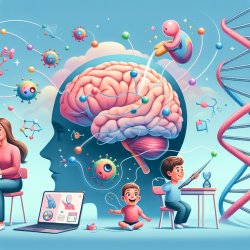Introduction to the Autism Brain Imaging Data Exchange (ABIDE)
The Autism Brain Imaging Data Exchange (ABIDE) represents a significant leap forward in understanding the intrinsic brain architecture of individuals with Autism Spectrum Disorder (ASD). This initiative aggregates and openly shares over 1,100 resting-state functional magnetic resonance imaging (R-fMRI) datasets, providing a rich resource for researchers and practitioners alike. The ABIDE dataset includes structural MRI and phenotypic information from 539 individuals with ASD and 573 age-matched typical controls, enabling comprehensive analyses of brain connectivity patterns.
Key Findings from ABIDE
The research conducted using ABIDE data has revealed critical insights into the functional connectivity of the autistic brain. Notably, the study reconciles previous conflicting reports of hypo- and hyperconnectivity in ASD by demonstrating that both phenomena exist, albeit with hypoconnectivity being more prevalent. This hypoconnectivity is particularly pronounced in cortico-cortical and interhemispheric connections, which are crucial for integrated brain function.
Additionally, the study identifies common loci of dysfunction in ASD, such as the mid and posterior insula and the posterior cingulate cortex, while also highlighting less commonly explored regions like the thalamus. These findings underscore the complexity of brain connectivity in ASD and the need for targeted interventions that address these specific areas of dysfunction.
Implications for Practitioners
For practitioners in speech-language pathology and related fields, these findings offer several actionable insights:
- Targeted Interventions: Understanding the specific brain regions affected in ASD can guide the development of more targeted therapeutic interventions. For instance, therapies that enhance connectivity in the identified regions could improve communication and social interaction skills.
- Data-Driven Approaches: Utilizing large-scale data from ABIDE can help practitioners make more informed decisions about intervention strategies. By aligning therapeutic approaches with the latest research findings, practitioners can enhance the efficacy of their interventions.
- Collaborative Research: The open nature of ABIDE encourages collaboration among researchers and clinicians. Practitioners are encouraged to engage with this data, contribute their findings, and collaborate on further research to refine therapeutic approaches.
Encouraging Further Research
The ABIDE initiative not only provides a valuable resource for current research but also sets the stage for future studies. Practitioners are encouraged to explore this dataset further, as it holds the potential for novel discoveries that could transform the landscape of ASD interventions. By pooling international datasets, ABIDE accelerates the pace of discovery and facilitates the development of more effective, evidence-based therapies.
To read the original research paper, please follow this link: The Autism Brain Imaging Data Exchange: Towards Large-Scale Evaluation of the Intrinsic Brain Architecture in Autism.










